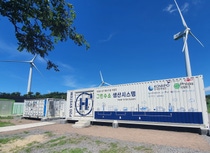Who we are
Joint News Release
BASF New Business and G-Philos sign MoU for cooperation in power-to-gas (P2G) business
- Up to 2022, BNB will supply NAS® batteries to G-Philos for P2G projects
Yongin, South Korea, and Ludwigshafen, Germany, September 10, 2020 – BASF New Business GmbH (BNB), a wholly owned subsidiary of the German chemical company BASF SE, and the leading Korean P2G system company G-Philos have signed a memorandum of understanding (MoU) to cooperate in P2G projects globally. Up to 2022, BNB will supply NAS® batteries that can provide a total of 19.2 MWh of energy to G-Philos for P2G projects. BNB will support G-Philos in further P2G projects and in the development of business with Power Conversion Systems (PCS) for NAS® batteries in South Korea as well as in the global market. Through the collaboration, the two companies expect synergy effects in the field of P2G systems for green hydrogen production.
Green hydrogen production from renewable energies, such as solar, wind and hydro, without CO2 emissions has been drawing ever-more global attention in recent years. In South Korea, the Green New Deal comprises plans to invest KRW 73.4 trillion ($61 billion) in projects, including renewable energy and hydrogen, as a part of South Korea’s policy to transform into a low-carbon society. P2G technologies will be one of the key elements of this plan. South Korea is expanding its renewable energy supply and clean hydrogen production in a similar manner to the E.U., which recently announced its own Hydrogen Strategy. With the recently signed MoU, BNB and G-Philos are now joining forces to support the expansion of green hydrogen production from renewable energy.
BNB distributes NAS® batteries produced by NGK Insulators Ltd. NAS® batteries are high-energy, long-duration sodium-sulfur batteries designed for stationary energy storage. With their capability to discharge for 4–8 hours, NAS® batteries are ideally suited for applications such as renewable power stabilization and integration into the grid. In order to use the electrical energy stored in the battery, a power conversion system (PCS) is needed.
G-Philos has developed a suitable PCS for a 200 kW NAS® battery system. The battery and the PCS have already been commissioned in a P2G project implemented by G-Philos in collaboration with Korea Midland Power (KOMIPO) at Sangmyung Wind Farm (21 MW), Jeju Island, South Korea. In this case, the NAS® battery serves as an energy buffer between wind turbines and electrolyzers to ensure stable hydrogen production from surplus wind power despite the fluctuating nature of wind. G-Philos can now supply PCS products for the NAS® battery systems ranging from 200 kW up to 800 kW.
Gawoo Park, CEO of G-Philos, said: “In order to stably produce green hydrogen while accommodating the variability of renewable energy, the NAS® battery is expected to play an important role in securing system operation safety and reliable long-term operation as an energy buffer. G-Philos will keep focusing on commercializing green hydrogen production through various P2G projects.”
BNB’s Director of E-Power Management, Frank Prechtl, said: “Green hydrogen production is an upcoming market and a promising application for NAS® batteries. With G-Philos, we now have a strong and competent partner to develop this opportunity into a sizeable business.”
About BASF New Business
BASF New Business GmbH (BNB) is a wholly owned subsidiary of BASF SE. The purpose of BNB is to support the growth targets of BASF by identifying and generating new businesses which are beyond the core business of BASF group but within target portfolio of BASF. BNB is primarily active in arising markets with higher-than-average growth rates. In addition to its head office in Ludwigshafen, Germany, BNB has offices in Hong Kong, Korea, Japan, Taiwan and the United States. Founded in 2001, BNB utilizes startup-like structures and methods as well as an extensive internal and external collaboration network. It works closely with future customers to build-up and expand new businesses.
BNB includes the unit Foresight & Scouting as well as Chemovator GmbH, a wholly owned BNB subsidiary based in Mannheim, Germany, which serves as BASF’s internal incubator, offering a protected space for all employees to accelerate speed-to-market for innovative business ideas. In addition, BNB currently has three Business Build-Up units: 3D printing (in the form of wholly owned BNB subsidiary BASF 3D Printing Solutions GmbH), E-Power Management and Functional Feed Additives.
The activities of BNB are complemented by BASF Venture Capital GmbH (BVC), a wholly owned subsidiary of BNB. BVC invests worldwide in young companies and funds with disruptive technologies and business models based on chemistry.
Further information at: www.basf-new-business.com.
About BASF
At BASF, we create chemistry for a sustainable future. We combine economic success with environmental protection and social responsibility. More than 117,000 employees in the BASF Group work on contributing to the success of our customers in nearly all sectors and almost every country in the world. Our portfolio is organized into six segments: Chemicals, Materials, Industrial Solutions, Surface Technologies, Nutrition & Care and Agricultural Solutions. BASF generated sales of €59 billion in 2019. BASF shares are traded on the stock exchange in Frankfurt (BAS) and as American Depositary Receipts (BASFY) in the U.S.
Further information at www.basf.com.
About G-Philos
G-Philos has been on the right path to realizing its vision of becoming a global leader in the development and manufacture of power conversion systems for renewable energy applications since 2009.
After investing considerable efforts into developing and manufacturing highly efficient power conversion systems for over 10 years, G-Philos has established itself as a market leader in power conversion systems (PCS) for fuel cells and power-to-gas (P2G) systems linked to renewable energies for green hydrogen production in Korea.
Further information at www.g-philos.co.kr
Media contacts:
BASF G-Philos
Christian Müller Kyumoon Um (엄규문)
Communications and Marketing Director (이사)
Phone: +49 621 60-43340 Phone: +82-31-548-2050
christian.d.mueller@basf.com km65um@g-philos.co.kr
P-20-299


